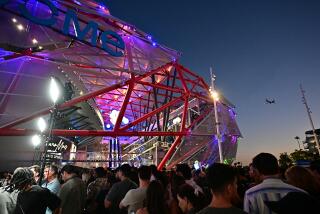California high court rules cover charge at parties creates liability
SAN FRANCISCO — Party hosts who ask guests to pay a cover charge to defray costs may be held legally responsible if an underage drinker becomes intoxicated and hurts himself or others, the California Supreme Court decided Monday.
In a unanimous ruling, the high court said a cover charge amounts to a sale of alcohol, and state law creates liability for those who sell alcohol to obviously intoxicated minors.
The decision, which overturned two lower court rulings, is most likely to affect student parties, where underage drinking and cover charges are common.
“We should err on the side of permitting liability, for the possibility of liability may provide a strong deterrent against the provision of alcohol to minors, especially those who are already obviously intoxicated,” Justice Kathryn Mickle Werdegar wrote for the court.
The ruling revived a lawsuit filed by the parents of Andrew Ennabe, 19, who attended a party given by another college student in Diamond Bar. Uninvited guests were charged $3 to $5 to enter the gathering and imbibe.
Thomas Garcia, who was 20, arrived uninvited and already intoxicated and paid for admission. As he was later leaving the party, he struck Ennabe with his car. Ennabe died about a week later.
Ennabe’s parents sued Jessica Manosa, who was 20 when she held the party at an unoccupied rental home owned by her parents and provided alcohol and a disc jockey. Manosa’s parents did not know about the party, but they may be held liable because their daughter was living with them and the party was held on their property.
Manosa said she invited several friends, but strangers who heard about the party through text messages began arriving. She said she did not know Garcia and had not seen him at her party.
Her attorneys argued the cover charge was meant only to defray the costs of the alcohol and did not constitute sales. Any other ruling would make all sorts of hosts vulnerable if they asked for any compensation or even demanded a dish at a potluck, they insisted.
“The assertion is exaggerated,” Werdegar wrote. “One does not normally charge guests an entrance fee to attend bar mitzvahs, weddings or gallery openings.”
A seller of alcohol may include “a private person who was not engaged in a commercial enterprise,” the court said. But it discounted arguments that the ruling could be broadly applied to all sorts of social settings.
“We need not sweep all informal potlucks into the jurisdiction of the Department of ABC’s licensure purview,” Werdegar wrote, referring to the state Department of Alcoholic Beverage Control, the agency that enforces alcohol consumption laws.
The court described Manosa’s party as “a pop-up nightclub that required a cover charge for entry.”
“A social host can retain her immunity by simply refraining from charging any of her invited guests,” Werdegar wrote.
Amer Innabi, who represents Ennabe’s parents, called the ruling “common sense.”
Gary Watt, a Northern California attorney who represents defendants in such cases, questioned whether the ruling reflected the intentions of the Legislature when it created liability for people who sell alcohol to obviously intoxicated minors.
The Legislature’s focus was on “commercial motive,” and lawmakers refused to make minor social hosts liable, he said.
“Today, via a circuitous journey through the Business and Professions Code, the Court says that minors can be liable in the home setting,” Watt said.
Manosa’s attorney declined to comment.
More to Read
Sign up for Essential California
The most important California stories and recommendations in your inbox every morning.
You may occasionally receive promotional content from the Los Angeles Times.










